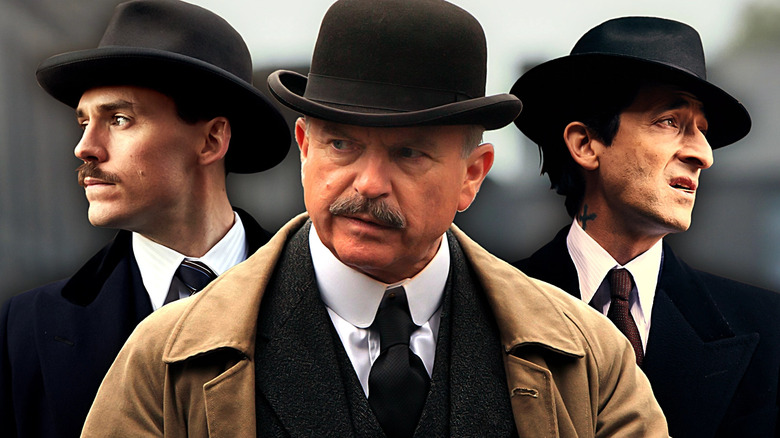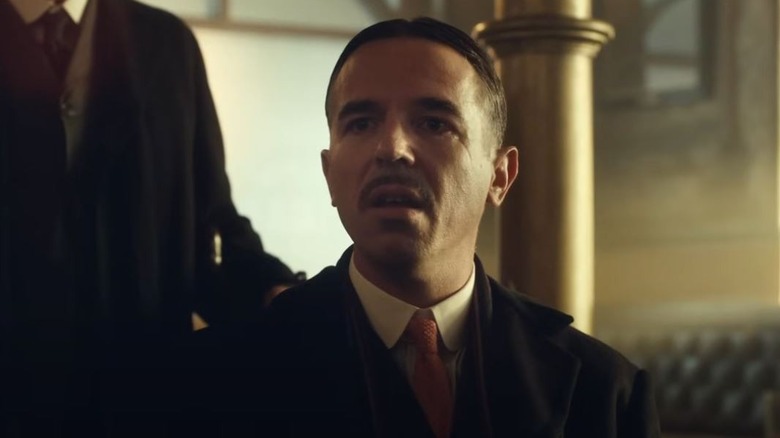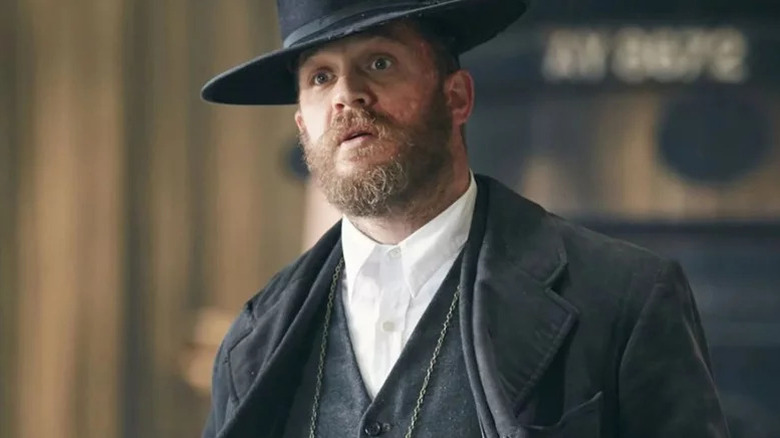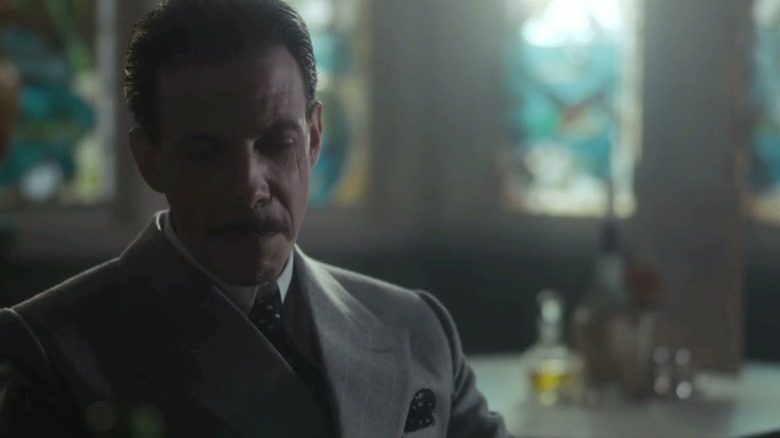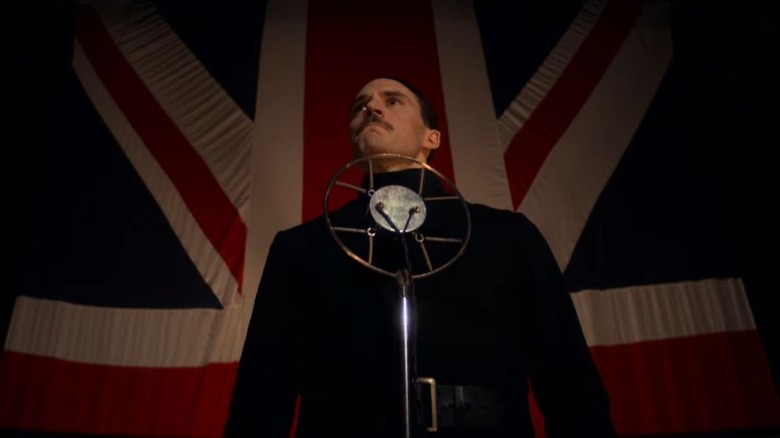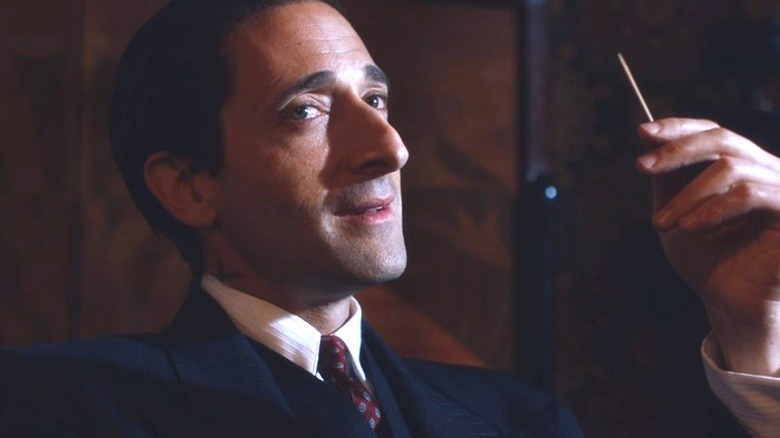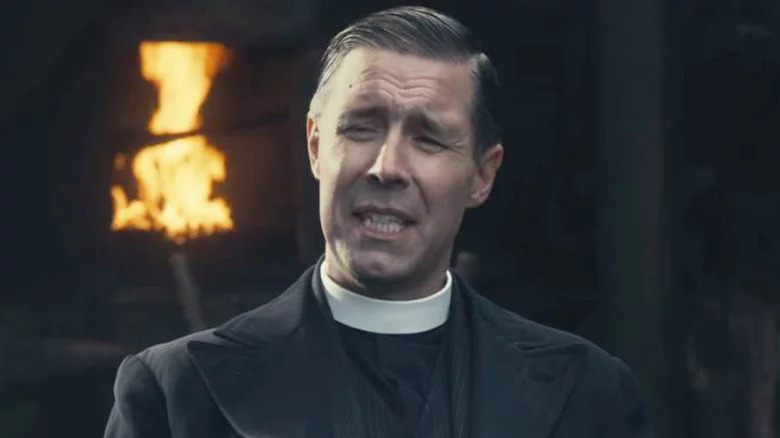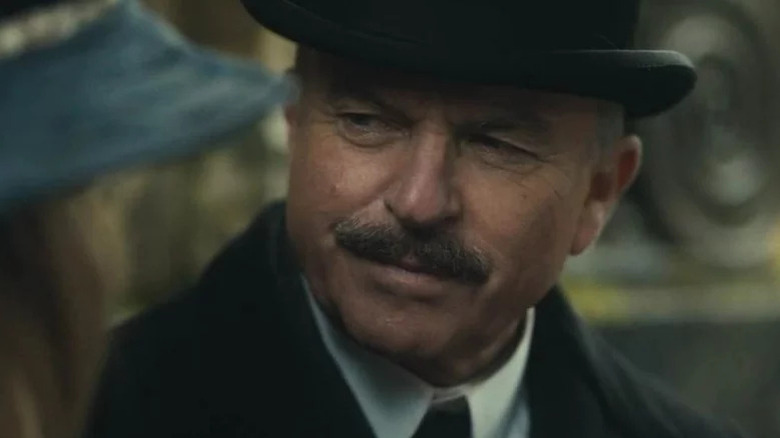Every Major Peaky Blinders Villain, Ranked
Steven Knight's period crime drama "Peaky Blinders" is a show that has no shortage of good villains. In fact, pretty much every single major character on the show is a villain from someone else's point of view, regardless of their actual alignment in the eyes of the law. This goes with the territory, seeing as the series' most prominent protagonists include people like noted crime lord turned politician Tommy Shelby (Cillian Murphy), his no less dangerous aunt Polly Gray (Helen McCrory), his volatile brother Arthur (Paul Anderson), and a whole host of their relatives, friends, and acquaintances.
With protagonists like that, you need a gallery of adversaries for the ages, which is precisely what "Peaky Blinders" made its business to cultivate. The show's finest antagonists are most definitely more antagonistic than your average gang member or pocket-stuffing, shady businessman. All members of this group of arch-villains are easily evil enough to pose a serious threat to the titular gang — and, in some cases, to entire countries.
7. Billy Kimber
This particular spot was surprisingly difficult. Technically, key season 6 antagonist Michael Gray (Finn Cole) should be on the list, given that he's the last threat Tommy Shelby faces in the show's final season (so far). Yet, Michael's not really a particularly impressive villain, and his conflict with Tommy comes across as a sad necessity of fate instead of a true, nail-biting conflict.
Billy Kimber (Charlie Creed-Miles), on the other hand, is very definitely a threat. In fact, he's the perfect starter villain for "Peaky Blinders" season 1. His crudeness and delusions of grandeur are diametrically opposed to the suave and calculating Tommy, and his aesthetic is a far enough cry from the Blinders' signature flat cap chic to stand out. He exists to show the viewers that this is what a typical crime lord looks like in this day and age, and that Tommy is the ultra-cool exception to the norm.
Because of his role in setting up the world and the story, Billy isn't quite as much a character as he is an antithesis of one: He's here to be what Tommy Shelby isn't. Tommy is feared and ruthless when he needs to be, but he's thoroughly human and can be pleasant. Meanwhile, Billy is needlessly cruel and dismissive. Tommy is an intelligent romantic. Billy is a dim-witted, predatory creep. Tommy is dashing and rocks a sweet, textured undercut hairstyle, while Billy prefers a thin mustache and an oily middle parting. You get the drill. Regardless, Billy is still the leader of the Birmingham Boys, and for a time, the show presents him as more powerful than Tommy. Combine this with Charlie Creed-Miles making the most of his scenes as the evil gang leader, and you have all the makings of a memorable monster.
6. Alfie Solomons
A comic relief. A ruthless killer. A crime lord. A man of peace. An intelligent manipulator. A potty-mouthed rambler. By his own design, Alfie Solomons (Tom Hardy) is a man who contains multitudes, and expresses each and every one of his aspects with his signature monologuing and general eccentricity. It's all part of the grand tapestry that makes up one of the most intriguing and hard to decipher characters on "Peaky Blinders."
The reliably duplicitous but endlessly entertaining Camden Town gangster would be in the mix for the top spot if this was a ranking of the show's greatest characters, propelled by both his personal merits and his stellar banter with Tommy. Since we're talking exclusively about villains, however, the character's signature complexity makes things a bit more difficult.
Is Alfie really a villain or even an antagonist? On occasion, yes. However, in the grand scheme of things, this slippery, larger than life crime lord is far closer to an incredibly untrustworthy deuteragonist with a chronic back-stabbing syndrome than anything resembling a full-on enemy. As fascinating as it makes Alfie as a character, it hurts his ranking in the grand scheme of sheer "Peaky Blinders" villainy.
5. Darby Sabini
Darby Sabini (Noah Taylor) is what you get if you take Billy Kimber, add some restraint and personality, and change who he's meant to reflect. By no means the most unique or outrageous antagonist the Peaky Blinders face, Darby enters the season 2 fray as a superficially refined mirror to more dangerous underworld figures: His London rival Alfie Solomons and, to a lesser extent, Arthur Shelby in the middle of his wildest "By order of the Peaky Blinders" stage. As such, unlike the brutish and small-minded Kimber, Sabini plays the role of an efficient and clever gangster who simply happens to be on a collision course with other factions.
Darby is one of the few villains who actually survive their encounter with the Peaky Blinders, and while he takes a behind-the-scenes role after season 2, his association with certain elements of the New World mafia comes in play later in the game. Taylor's soft-spoken portrayal is normally quite different from Charlie Creed-Miles' take on Kimber, but takes on similar brutish elements once Sabini loses his cool — which may be a nod to the fact that the real-life Kimber and Sabini knew each other and were mortal enemies.
While powerful, Sabini — just like Kimber — suffers from his role as a comparison point to more interesting and significant characters. This hinders his ability to stand out and ultimately leaves him without a certain je ne sais quoi that other, more memorable "Peaky Blinders" villains have in abundance.
4. Oswald Mosley
When you look at the six "Peaky Blinders" seasons as a whole, Oswald Mosley (Sam Claflin) is the closest thing the show has to an overarching Big Bad. Such a role is certainly justified: As the head of the British Union of Fascists, he's a dangerous and charismatic racist who makes the viewer's skin crawl with the sheer weight of history's evil.
Mosley is a chilling villain because what he represents is obvious to the viewer (and several major characters), but this doesn't translate to the way he carries himself and the sway he holds in the supposedly civilized halls of power. Apart from his liberal use of slurs and the vile opinions that he holds, Mosley can come across as eloquent — and while he's controversial, he nevertheless ranks as one of the country's elites. While the character himself isn't quite as impressive as several others on this list, Mosley is terrifying because his deeply skewed ideals represent the rise of fascism and the impending World War II ... and because he, like lower-level crooks Kimber and Sabini, is based on a real historical person.
3. Luca Changretta
Adrien Brody's Luca Changretta is the driving force of "Peaky Blinders" season 4, and the character who carries the majority of the season's story arc on his back. This vengeful American mafioso is out to avenge the deaths of his family members, and acting him is a challenge. Luca always needed to come across as a man who can intimidate even Tommy Shelby himself, and he had to be able to believably command an invading vendetta force that can drive the Peaky Blinders on the ropes — on their home turf in Birmingham, no less.
On paper, this might seem like an impossible task, and honestly? There are probably "Peaky Blinders" fans who'd say that Brody couldn't rise up to the challenge. For me, however, Brody is the perfect Luca. He cuts a lean, mean, impossibly intimidating presence, eternally balancing on the line between nuance and scenery-chewing to illustrate the violent and volatile man hiding under the smirk and the perfectly-tailored suits. Luca is a magnetic presence, a villain whom the viewer loves to watch because there's a very real possibility that he might actually be winning. When the mobster ultimately goes down and breaks into a desperate mess, it feels like the kind of victory few other moments on the show can match. Really, it's no wonder that Brody begged for his character's life on "Peaky Blinders." After all, even for an Academy Award winner, roles like this don't grow on trees.
2. Father John Hughes
The primary antagonist of "Peaky Blinders" season 3 is technically just one cog in a vast conspiracy machine, but what a filthy, devious, self-aggrandizing cog Father John Hughes (Paddy Considine) turns out to be. Considine is no stranger to playing heroes, villains, monsters, or just everyday downtrodden folks. In Father Hughes, agent of the Economic League, he manages to use all sides of his craft: Hughes thinks he's a hero, but he's really a monster, and audiences can't help but wait for him to be trodden on.
Every season of "Peaky Blinders" has its own theme, and season 3 marks the Shelbys' first departure from their usual gangster antics and into the world beyond. Plot lines like Russian notables fleeing the clutches of the freshly-formed Soviet Union and a powerful right-wing organization called the Economic League expand the show's stakes from regional to global — and Hughes is sitting in the middle of it all, holding the strings while constantly finding ever lower depths to sink to. Blackmail and kidnapping are just some tools in this loathsome antagonist's bag, and to top it all off, he's revealed to be the abusive former custodian of Michael Gray.
While many other villain death scenes on "Peaky Blinders" are fairly cathartic, Hughes remains vile even in his final moments. During his final confrontation with Michael, the evil priest somehow manages to be condescending, cowardly, hateful, and creepy within the span of a short struggle ... and when he at long last ceases to breathe, it's easy to just be happy that it's finally over.
1. Inspector Chester Campbell
Inspector Chester Campbell could easily have been just a high-ranking police officer who's out to get the criminal protagonists. Fiction is full of characters like that. Fortunately, "Peaky Blinders" had the immeasurable foresight of casting Sam Neill.
When Neill took the role, fans who only knew him as Dr. Alan Grant in "Jurassic Park" were in for the same kind of slap on the face "Doctor Who" fans would later receive when David Tennant delivered a career-best performance as the mind-controlling Kilgrave on "Jessica Jones." For two seasons, Neill gave us one of the most horrible police officers the small screen has ever witnessed. Campbell's smirking, sadistic, religion-tinted devotion and perverted passion hide just behind his prim and proper bowler hat and mustache, belied by an occasional dose of honey in the booming Belfast accent that none other than Liam Neeson helped Neill with.
I understand that this may be a personal bias, but I'm very much a Sam Neill guy. He's just one of those actors who can do anything, from the quirky indie comedy-drama of "Hunt for the Wilderpeople" (2016) to the stone cold Lovecraftian space horror of "Event Horizon" (1997) with equal gusto. Chester Campbell is the character Neill poured his entire "best of" into, and the end result is a sight to behold. Smartly, the show often opts to pair Campbell's cruel gravitas with actors who can match it: Cillian Murphy and Helen McCrory, whose Polly Gray becomes Campbell's achilles heel and ultimately doom. It's telling that the show had to introduce a whole international conspiracy to make up for Neill's departure from the series — and even that was never quite enough.
